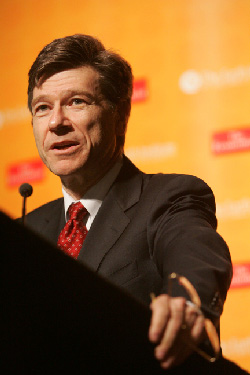Jeffrey Sachs, the influential economist at Columbia University, shared a sobering perspective as part of an impressive lineup of speakers at Tuesday's World Business Forum in New York. In his speech, he pulled a fire alarm on the optimism on leadership in business and opportunities abroad with his perspectives on the bipartisan failure of US policy making and the world's near-certain risk of ecological bankruptcy.
The saddening part is that the message may have fallen on deaf ears, with Wall Street Journal running what was only a side comment from Sachs, and little of the message making it out of Radio City Music Hall unscathed. This was due, perhaps in part to the audience's composition and the slightly morbid tone of his presentation. Sometimes bad news is just bad news.
 Bipartisan political failure in the US
Bipartisan political failure in the US
Sachs began with a quick overview of the essence of our current crisis, which he argued is finance based. "Beneath the rubble, lay complete lack of proper regulation in lending, which was the direct cause." We broke down walls between investment and consumer banks, created derivatives that could be sold to those who had no idea what they were really buying, and all of this occurred outside of regulation.
Then, as bailouts were handed out to Wall Street's banks, the underlying and critical problem with our political system became clear as the financial sector spent $3.7 billion lobbying for its interests. Yesterday, NY Times Economist and World Business Forum speaker Paul Krugman, reiterated this, noting that we may have bailed out banks too fast, restoring them back into full control only so that they can lobby against any regulation that may be in the sector's best interests.
Sachs described the current state of policy making to something that happens behind closed doors with those representing only their own interests, as the sideshow we see is performed for the greater public. Guess which sector is the second largest spender in lobbying? Healthcare.
Policy is the easy part compared to climate challenge
Sachs then went on to describe the bigger challenges-a crowding planet that hasn't even begun to acknowledge the limited nature of its resources. We have almost 7 billion people in a $70 trillion dollar world economy, which is connected to an environmentally unsustainable model. At this pace, we are on track to emit enough greenhouse gases to wreck the planet in 30 to 40 years. The audience didn't seem quite receptive, despite his warning that it is time to take quick and severe action. After all, the logos of sponsors Shell, and Delta were cast behind him on the Radio City Music Hall screen.
As further proof, Sachs continued, we are eating the other 99.9 million species on this planet out of existence. Paul Krugman added yesterday that the NY Times did a feature this week on what we eat, or perhaps more what we have no idea that we are eating, in reference to ground beef that "neither the system meant to make the meat safe, nor the meat itself, is what consumers have been led to believe."
As the world continues to grow, Sachs said, China, India, and Africa are doing to want the resources they rightfully deserve. And the arithmetic doesn't add up. With an average income of $40k in the US and $10k in the rest of the world, we should expect a 4x increase as the rest of the world catches up. All this as population continues to grow at a rate of 800MM annually. Sachs bluntly concluded that we haven't even begun to wrap our heads around our current situation, despite the effects we've felt in past water and oil shortages.
Global cooperation is the only choice
The only solution, Sachs argued, was global cooperation, likely led by the G20, the group of finance ministers and central bank governors from 20 leading economies. If we believe that the US can do it alone, we will not find the necessary global solutions. Global cooperation lies at the center of our ability to survive, which may require nuclear energy and, the unspoken tactic that few dare to mention, family planning to stabilize population growth. Sustainable development must be attended to as the central challenge, not a side not taught in the classrooms of kids who will face the climate challenge as perhaps the greatest challenge of their lives.
You now know have access to the information that was shared with and seemingly brushed off by thousands of executive attendees, as well as a long list of journalists and bloggers. Sure, Sachs did mention that former Federal Reserve chairman Alan Greenspan was responsible for "putting fuel on the fire" of the lending bubble, as the WSJ reported. But that was only one premise in support of a much bigger argument. So, what happens now? Do we choose to selectively hear that which is pleasing to us in what is a scary but real challenge to the future of business and society, or do we have the guts to listen, respond, and even act?
This was originally posted on Triple Pundit.
Ryan Mickle is Co-publisher of Triple Pundit, which hosts a conversation on sustainable and conscious business, and Founder of Companiesandme.